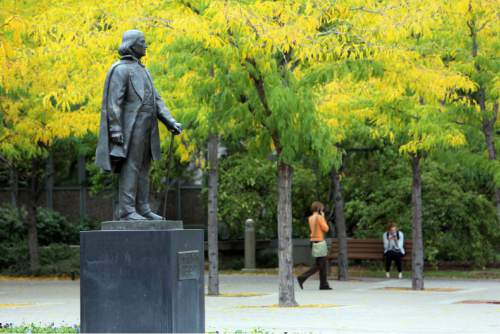This is an archived article that was published on sltrib.com in 2016, and information in the article may be outdated. It is provided only for personal research purposes and may not be reprinted.
You are far from home. In a hotel room. Alone. You wake up in the middle of the night and realize the room is on fire.
The flames and smoke block your way to the door. The window is locked. For, of course, your own protection. You could break the window to escape. You could use a chair in the room to smash the glass.
But wait. Breaking other people's windows is against the law. So is smashing up their furniture. Best to just sit there and burn. Wouldn't want to break the rules.
Absurd?
Of course it is.
But as the people who are in charge of Brigham Young University, and those who love and revere the institution, struggle to deal with the growing scandal of how female students who are victims of sexual assault are treated by the school, one thing should be clear.
No reasonable person is arguing that BYU shouldn't have standards. Nobody says the school shouldn't follow the moral teachings of its parent institution, The Church of Jesus Christ of Latter-day Saints. No one is saying that the school's venerable Honor Code is, by itself, the problem.
No one is proposing that breaking windows and destroying other people's property ought to be made legal in order to accommodate the rare instances of a necessary rescue from a burning building.
But if we heard that someone in such a scenario was being prosecuted for aggravated vandalism rather than being honored for bravery, we'd all wonder if the law hadn't lost its ever-loving mind.
What many people, from BYU students to far-off commentators who never heard of the school's Honor Code before last month, are rightly worried about is that too many young women have been made to feel that they were being victimized a second time when their reports of being raped or otherwise assaulted were turned against them.
Stellar reporting by The Salt Lake Tribune, the facts of which have not been challenged, has made clear that several assault victims have been placed in the position of being the accused, questioned, or punished, for such Honor Code violations as drinking or using drugs or being in the wrong place at the wrong time.
This when the only legal, ethical, humane — and, one might think, Christian — thing to do would be to offer help and comfort to the victims of assault and not to make them feel worse, if that's possible, than they already do.
Followers of the LDS faith and supporters of BYU's mission argue, strongly and with reason, that a faithful observance of Honor Code standards actually protects women from situations where they might be victimized. Some separation of the genders and general abstinence from mood-altering substances do, indeed, have that effect. Especially among young adults.
BYU's administrators have issued the proper statements, condemning sexual assault in all its forms. They have also launched an initiative — including a comment-seeking website — to address the issue and come up with better ways to deal with such incidents in the future.
The details may be complicated. The ethical question is simple. Rape victims are victims. Full stop.
Treating victims as though they have only themselves to blame for their pain is not something that is, to whatever degree it may exist there, unique to the LDS culture. It can be found in homes, churches, even police stations and courthouses, all over the globe.
The current situation is a striking opportunity for the LDS Church, along with its flagship institution of higher learning, to set a true moral example for the world. It won't have to deny any of its principles. It will only have to uphold them with more compassion shown to those who have already been violated.



